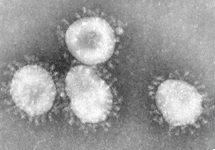Amy Smithson
September 19, 2007

SARS Virus, Source: WikiMedia Commons
View the full report:
Beijing on Biohazards: Chinese Experts on Bioweapons Nonproliferation Issues
Edited by: Amy E. Smithson, PhD
Sponsored by: The Carnegie Corporation of New York
The Essays
The paper is a collection of essays gathered due to little information available regarding China’s policies, activities, and priorities pertaining to biological weapons nonproliferation.
It is a reflection of the readiness of Chinese experts to discuss these important matters and of their evolving views on bioweapons nonproliferation. It is a reference for Western colleagues to contemplate, appreciate, agree and contest the issues. The essays are seeds for dialogue between top Chinese and Western policy analysts, scientists, and officials, whose complete biographies are available in the full report.
Chinese Experts
Liu Jianfei, PhD
Professor and Research Fellow
Institute of International Strategic Studies at the Central Party School
Contemplating the Threat of Biological Weapons Proliferation
Dr. Jianfei assesses the biological weapons threat from state and non-state actors. Liu sees bioweapons proliferation threat as being high, particularly because of the advances in the life sciences, and he posits that the most likely route to terrorist acquisition of biological weapons would be from states that perceive security threats from other countries and opt to put germ weapons into the hands of terrorists to divert their opponents’ attention.
Li Jinsong, MD
Professor, Institute of Microbiology and Epidemiology
Academy of Military Medical Sciences
Laboratory Biosafety of Pathogenic Microorganisms in China
Dr. Jinson explains the recent overhaul of China’s biosafety regulations following the 2002 outbreak of SARS. Li notes that a shortage of biosafety specialists in China will create a challenge for implementing his country’s new regulations and procedures to minimize the risk to workers and the public of laboratory research involving highly infectious pathogens.
Hu Longfei (MD, MPH)
Director and Chief Epidemiologist
Guangdong Health and Quarantine Bureau
Chinese Biosafety Laws and Regulations, Including Matters of Biosecurity and Oversight of Genetic Engineering Activities
Dr. Longfei and a team of public health officials discuss China’s biosecurity regulations and measures governing genetic engineering activities. China’s biosafety system calls for tougher physical security and accountability precautions for work with high-risk human and animal pathogens, and separate approvals are required for genetic engineering work that involves recombinant DNA, infectious agents, animal or plant pathogens, and human blood or other potentially infectious materials, particularly for work that might make a pathogen more deadly, communicable, or could result in other worrisome changes to the pathogen.
Wang Qian
Arms Control and Disarmament Specialist
The Foreign Ministry
Efforts to Strengthen Biosafety and Biosecurity in China
Wang Qian critiques China’s new biosafety and biosecurity measures. Among other recommendations for improved domestic implementation, Qian suggests that China’s new biosafety and biosecurity regulations apply not only to pathogenic microbiology laboratories but to all facilities in China working with high-risk pathogens, including hospitals, academic laboratories, and commercial facilities.
Yang Ruifu, PhD
Professor, Institute of Microbiology and Epidemiology
Academy of Military Medical Sciences
Biological Inspections in Iraq: Lessons for BWC Compliance and Verification
Dr. Ruifu relates lessons from his experience as a bioweapons inspector for the United Nations Special Commission in Iraq. Extrapolating from the results of the inspections in Iraq, Yang posits that inspectors can distinguish commercial and research facilities from those engaged in bioweapons activities and suggests that these inspections are a very valuable source of information about planning, inspector training, operational strategies, tactics, and technologies that could be useful to determine compliance with the Biological and Toxin Weapons Convention (BWC), which bans bioweapons development, production, and stockpiling.
MajGen. Pan Zhenqiang (ret.)
Deputy Chairman
China Foundation for International Studies
Putting the Nonproliferation of Biological Weapons on the Right Track
Mr. Zhenqiang advocates greater transparency in biological activities, the addition of a monitoring protocol to the BWC, a standing BWC inspectorate, universal adherence to the treaty, and assistance to states to improve pertinent domestic legislation and enforcement capabilities. Pan relates eight steps that Beijing is taking domestically to enhance China’s own bioweapons nonproliferation efforts and identifies three areas where China could improve its activities in that regard.
US Experts
Amy E. Smithson, PhD
Senior Fellow
Chemical & Biological Weapon Nonproliferation Program (CBWNP)
James Martin Center for Nonproliferation Studies
Report Introduction and Overview
Julie E. Fischer, PhD
Head of the Global Health Security Program
Henry L. Stimson Center
Observations on China’s New Biosafety and Biosecurity Framework
Bates Gill
Freeman Chair in China Studies
Center for Strategic and International Studies
